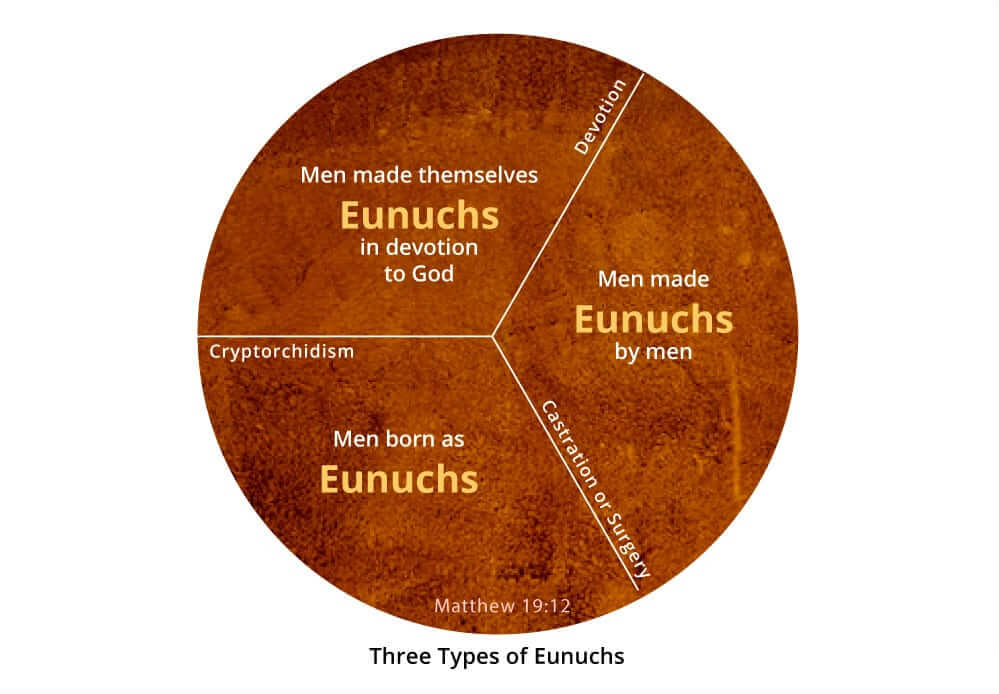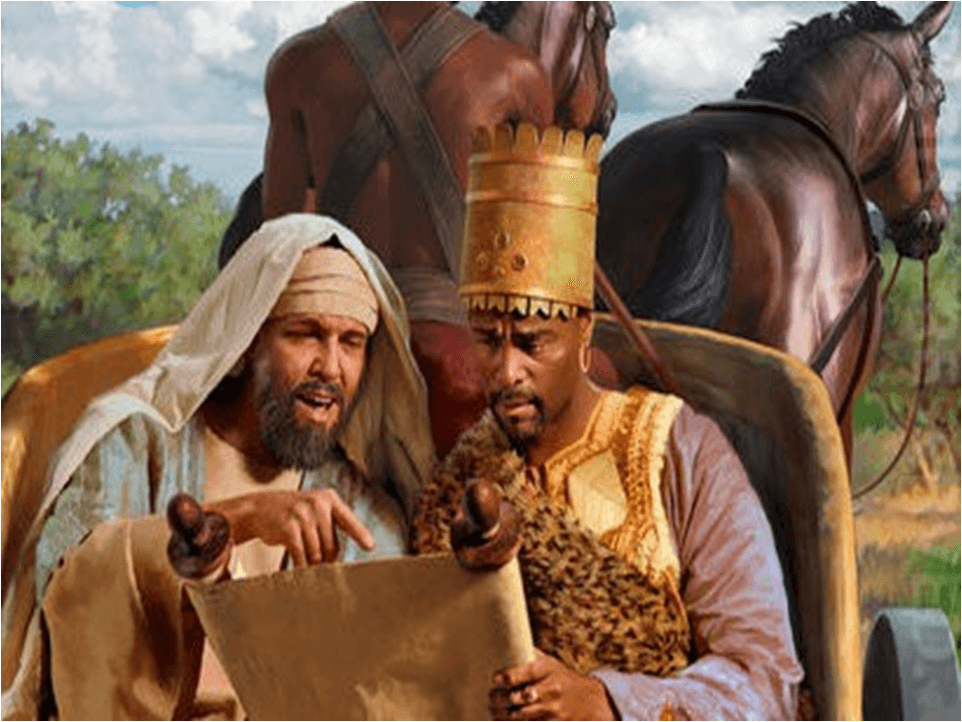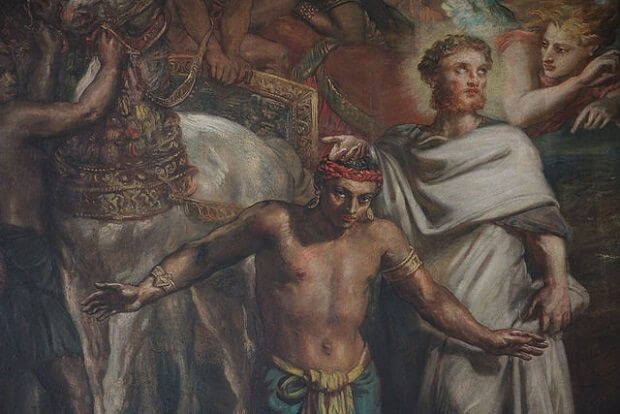Eunuchs are mentioned numerous times throughout the Bible, both in the Old and New Testaments. Gaining an understanding of who they were and the roles they played in biblical societies provides important cultural and historical context for many scriptural passages.
Eunuchs served in royal courts and wealthy households, held trusted positions, and sometimes wielded significant power and influence. Their presence threads through many of the Bible’s key narratives. Studying the biblical references to eunuchs sheds light on the ancient cultures in which the stories took place. It also reveals the remarkable ways that Jesus and the early church brought more inclusiveness to those who were often marginalized in ancient times. Understanding the concept of eunuchs in the Bible allows for a richer exploration of this sacred text.
Etymology and Definition

The term “eunuch” comes from the ancient Greek word eunoukhos, which meant “guard of the bedchamber.” It referred to castrated men who were employed as servants in royal palaces and harems to guard the women. The word is derived from eunen echein meaning “bed-guard”.
The word “eunuch” entered English in the late 14th century from the Latin eunuchus, which came directly from the Greek eunoukhos.
In a biblical context, a eunuch referred to a man who had been castrated. This could be someone born a eunuch or someone who was made a eunuch later in life. Eunuchs served in trusted positions in royal courts because they could not produce offspring that might threaten the ruler.
Mentioned in The Old Testament
Eunuchs are mentioned frequently in the Old Testament, often serving in prestigious positions in royal palaces.
Some key examples include:
-
Potiphar, an Egyptian officer, is described as a eunuch in Genesis 39:1. He was the master of Joseph when Joseph was taken to Egypt.
-
Ebed-melech, an Ethiopian eunuch in the court of King Zedekiah, helped rescue the prophet Jeremiah from a cistern in Jeremiah 38.
-
The Book of Esther mentions Hegai, a eunuch who was in charge of the harem of King Ahasuerus. Hegai was the custodian of Esther when she was taken to the king’s palace (Esther 2:3, 14-15).
Eunuchs like these often held trusted positions managing harems and attending to royal women in palaces. They sometimes rose to prestigious and influential roles in royal courts.
Roles and Responsibilities
Eunuchs in biblical times held important positions in royal households, often overseeing the king’s harem. They were entrusted with protecting and supervising the king’s wives and concubines, as well as managing the daily operations of the household.
Some specific roles included:
-
Royal Advisors – Eunuchs often served as close confidants and advisors to kings, given their access to the royal family’s private lives. They could wield significant influence in court politics.
-
Military Commanders – Trusted eunuchs sometimes held high-ranking military positions, likely due to their loyalty to the king.
-
Treasurers – Eunuchs were often appointed as treasurers and put in charge of the king’s finances, as they had no heirs to whom they might be tempted to divert funds.
-
Servants – Lower-ranking eunuchs served as royal attendants, running errands, delivering messages, and performing various tasks for the king’s family.
-
Harem Guardians – The chief duty of many eunuchs was to guard the entryways to the royal harem, limiting access to the king’s wives. They protected the women from unauthorized men.
Eunuchs held these critical positions because kings considered them loyal and trustworthy, given their inability to produce heirs or gain personal power. Their specialized roles gave them unique access to royal families.
Mentioned in The New Testament

Eunuchs are mentioned several times in the New Testament, primarily in the context of Jesus’ teachings and the early church.
-
Jesus references eunuchs in Matthew 19:12. He says, “There are eunuchs who were born that way, and there are eunuchs who have been made eunuchs by others–and there are those who choose to live like eunuchs for the sake of the kingdom of heaven.” This indicates that some people choose to be celibate and devote themselves fully to God’s work.
-
In Acts 8:26-40, Philip encounters an Ethiopian eunuch who is an important official in charge of the treasury of the queen of Ethiopia. Philip baptizes this eunuch, indicating that eunuchs were welcomed into the early Christian church.
-
In Matthew 19:12, Jesus affirms eunuchs who have made themselves “eunuchs for the sake of the kingdom of heaven.” This indicates some early Christians chose to live celibate lives to serve God.
The New Testament portrays eunuchs in a positive light, as sincere seekers of truth and servants of God. The early church welcomed eunuchs, valuing their devotion and service over physical condition.
Importance and Influence
Eunuchs played an important role in biblical events and narratives. As trusted servants in royal courts, they had unique access to kings and could influence political decisions. For example, Ebed-Melek the Ethiopian eunuch saved the prophet Jeremiah’s life when he was imprisoned (Jeremiah 38:7-13). Another eunuch named Philip witnessed powerfully to the Ethiopian eunuch in Acts 8, resulting in the man’s conversion and baptism.
This encounter was a significant milestone in the spread of the gospel message beyond the Jews to the Gentiles. Eunuchs are also portrayed positively in Isaiah 56, where God promises them an everlasting name and place in His house if they keep His Sabbath and hold fast to His covenant. Their faithful service put them in a unique position to impact biblical history.
Controversies and Questions
There are a few debates and controversies surrounding eunuchs in biblical texts. One issue is how to interpret Jesus’ statements about eunuchs in Matthew 19:12. Some see this as Jesus speaking positively about voluntary celibacy, while others view it as a reference to castrated men. There is also debate about whether the Ethiopian eunuch baptized by Philip in Acts 8:26-40 was a literal eunuch or a metaphor for a gentile convert.
Some also question the broader role and status of eunuchs in biblical texts. Were they fully accepted members of society, or were they marginalized? Did they have the ability to fully participate in religious rituals and rites? The presence of eunuchs serving in prestigious positions in some biblical accounts seems to conflict with prohibitions against their full inclusion found in Deuteronomy 23:1. There are differing perspectives on how to reconcile these aspects of eunuchs in the Bible.
Cultural Context

Eunuchs played important cultural roles in ancient Near East societies like Assyria, Persia, and Babylonia. Castration was seen as a sign of devotion and loyalty, as eunuchs sacrificed their manhood in service to rulers.
Eunuchs often served in royal courts as guards, servants, and advisors. Their inability to produce heirs reduced threats to the throne. Kings would appoint eunuchs to sensitive positions since they lacked family ties that could conflict with duties. Eunuchs had intimate access to royal bedrooms, harems, and the queen’s quarters, areas off limits to other men.
The use of eunuchs as court officials dates back to the 9th century BC in Assyria. Records describe eunuchs managing bureaucracy, overseeing accounting, and governing provinces. In the Neo-Assyrian Empire, eunuchs even commanded armies. The practice spread to neighboring lands like Persia and was later adopted by the Byzantine Empire.
Eunuchs also played religious roles. In some ancient pagan cults, priests would castrate themselves and dress as women to worship fertility goddesses. This practice continued with the cult of Cybele in Roman times. Eunuchs served as priests and temple servants for various Near East religions.
Relevance Today
While literal castration is rare today, some modern equivalents or applications of the biblical concept of eunuchs exist.
Some individuals opt for voluntary chemical or surgical castration to align their bodies with their gender identities. This allows them to live free of the influences of sex hormones they feel don’t match their inner sense of gender. However, this remains controversial.
Others abstain from sexual relationships voluntarily to devote themselves fully to spiritual pursuits. The Catholic Church has a long tradition of celibate clergy. Some Christians pursue celibacy outside of clergy roles to focus on ministry and service.
While no modern equivalent fully captures the complexity of biblical eunuchs, aspects resonate today. The themes of marginalization, gender identity, and voluntary celibacy for spiritual devotion still hold relevance.
Conclusion
In summary, eunuchs played an important and multifaceted role in biblical history. They served in royal courts, held positions of power and influence, and in some cases received special promises and recognition from God. While controversial at times, they provided a representation of diversity and inclusiveness within the biblical narrative.
Some key takeaways regarding biblical eunuchs include:
-
They held trusted positions in royal courts and households, being appointed as servants, treasurers, or guardians. This demonstrated great faith on the part of rulers.
-
Certain Old Testament regulations prohibited eunuchs from entering the assembly of the Lord or holding priestly positions. This reflected cultural views at the time.
-
However, the prophet Isaiah spoke of a future day when eunuchs would be given “a name better than sons and daughters” in God’s house. This pointed to their value and inclusion.
-
Eunuchs like the Ethiopian official Philip encountered acted as early converts and spreaders of the gospel outside of Jerusalem. This illustrated the expansive reach of Christianity.
In the end, eunuchs emerged as a vital part of the biblical narrative, highlighting themes of service, redemption, diversity, and inclusion that resonate throughout scripture. Their presence provides an insightful lens for understanding biblical views on gender, authority, and society.








